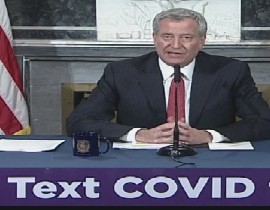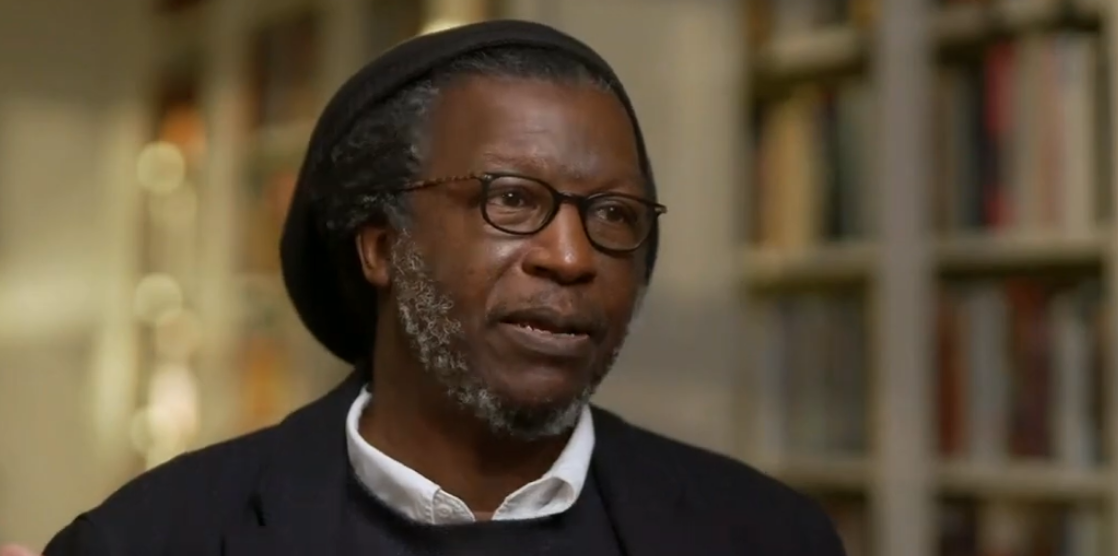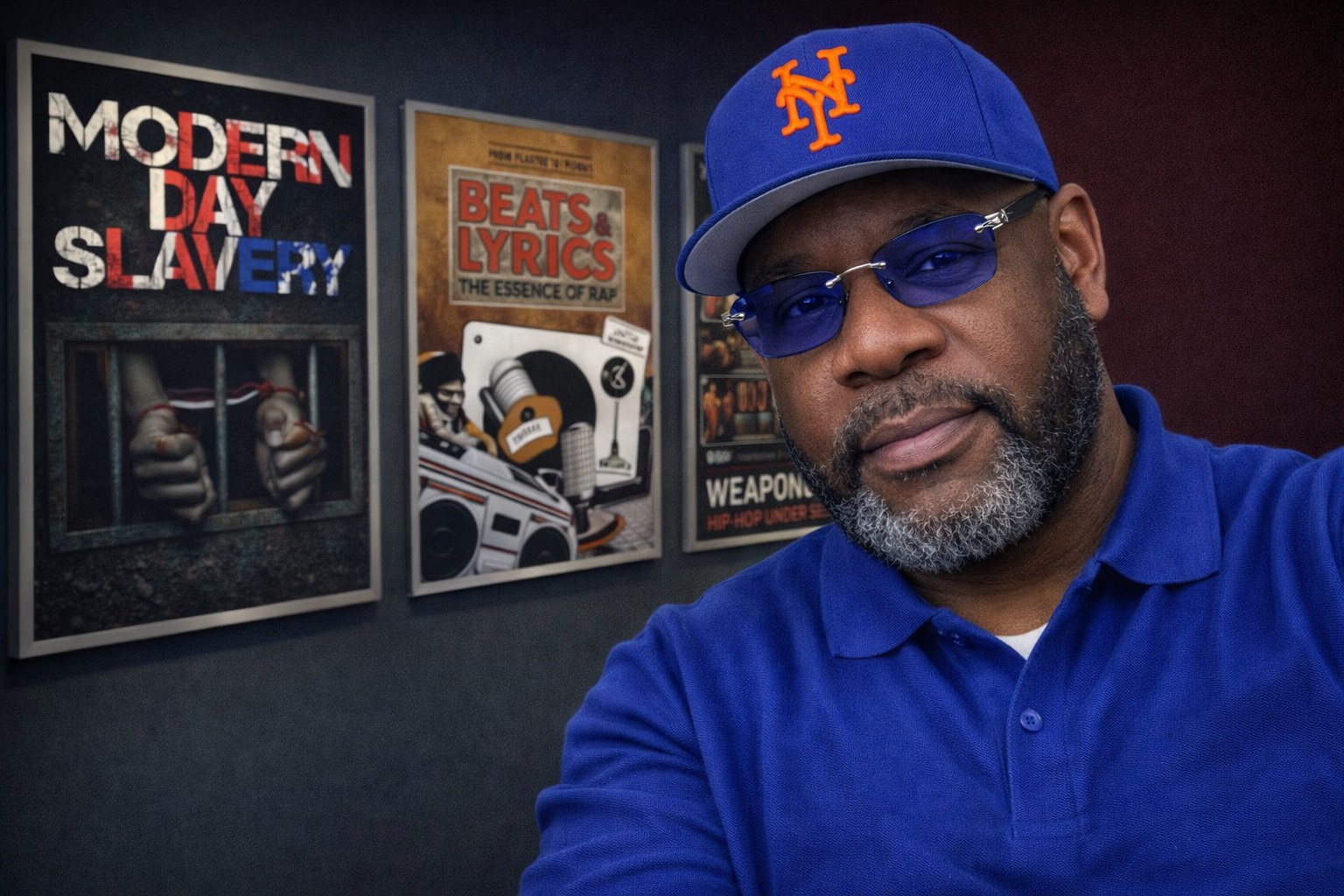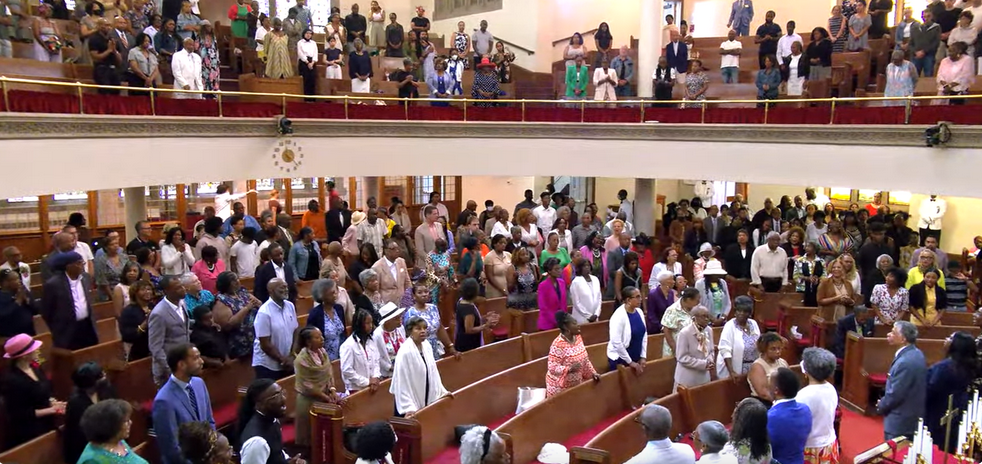[Interner Acess\COVID-19]
de Blasio: “Our mission to deliver affordable, high-quality internet service has never felt more urgent. COVID-19 has further exposed the inequalities in internet access.”
Photo: Youtube
Mayor de Blasio is announcing accelerated Internet access to hard-hit COVID-19 neighborhoods.
Mayor de Blasio, Taskforce on Racial Inclusion & Equity co-chairs First Lady Chirlane McCray, Deputy Mayor J. Phillip Thompson, and Deputy Mayor Dr. Raul Perea-Henze today announced that the City will accelerate broadband deployment in all five boroughs, prioritizing public housing communities, which have suffered disproportionately during the COVID-19 pandemic.
The City will make a historic $157 million investment in ending digital redlining and providing high-speed internet, including $87 million redirected from the NYPD budget. This investment will extend new internet service options to 600,000 underserved New Yorkers, including 200,000 NYCHA residents over the next 18 months. This approach will create a path to NYCHA-wide implementation and universal broadband across New York City.
“Our mission to deliver affordable, high-quality internet service has never felt more urgent,” said Mayor Bill de Blasio. “COVID-19 has further exposed the inequalities in internet access while changing the way New Yorkers work, learn, and live. Accelerating universal broadband access will make our city healthier, safer, and more equal.”
“Broadband service has quickly become as necessary to modern life as electricity and running water. Having it or not having it can be a matter of life and death, particularly for communities of color, which may be cut off from critical health alerts and other information during the COVID-19 crisis,” said First Lady Chirlane McCray. “Universal broadband means that Black and Brown New Yorkers will have access to health care, educational resources, employment opportunities, and social programs, which will help them stay connected and strengthen these communities for generations to come.”
As part of the plan, the City will work with M/WBE service providers and community-based organizations who will create a pipeline to jobs by training, certifying, and employing adults and youth to install and operate network infrastructure.
“As our lives increasingly move online, especially during a time where in-person engagement risks the health and safety of New Yorkers, it is critical that communities of color are not left behind due to their inability to afford internet access,” said J. Phillip Thompson, Deputy Mayor for Strategic Policy Initiatives and co-chair of the Taskforce on Racial Inclusion and Equity. “Not only will affordable broadband service increase access to health care, educational opportunities and jobs, it will also strengthen participation in our democracy. By giving historically underrepresented communities the ability to register to vote, fill out the Census, engage with elected officials, and take other actions online, we can ensure their voices are heard and included in decision-making as we work to create a fair and equitable recovery in New York City.”
“The COVID-19 pandemic shows that staying healthy depends on staying connected in our virtual world, and that means more broadband for New Yorkers who need it most,” said Dr. Raul Perea-Henze, Deputy Mayor for Health and Human Services and co-chair of the Taskforce on Racial Inclusion and Equity. “Our plan to close the digital divide will empower communities hit hardest by the virus with online access to build a fair recovery and equitable future.”
According to the NYC Internet Master Plan, 46% of New York City households living in poverty do not have broadband at home. A full 18% of all New York City residents – more than 1.5 million people – have neither home nor mobile connection. Internet use is foundational to economic mobility, but current broadband subscription costs can impose a considerable burden on the budgets of low-income families.
“A key tool in helping us eliminate the inequalities that still exist throughout New York City is ending the digital divide once and for all,” said Laura Anglin, Deputy Mayor for Operations. “COVID-19 has only further exposed these inequalities, and all New Yorkers should have access to affordable, high-speed internet regardless of the size of their paycheck or where they live. We know that universal broadband can help lift up these communities by connecting them to the essential services and resources they need.”
“The digital divide and the unequal access to information experienced by so many communities of color during the COVID-19 pandemic demonstrates the necessity of affordable, fast, and reliable internet. Expanding access will enable our NYCHA families to access essential health, educational, and employment resources,” said Vicki Been, Deputy Mayor for Housing and Economic Development. “Thanks to our agency partners for making a meaningful difference for NYCHA residents.”
“New York City’s digital divide is a barrier to individual opportunity, creates risks related to public health, and presents a threat to long-term economic growth,” said John Paul Farmer, Chief Technology Officer. “By investing and partnering to deliver low-cost broadband for communities in need, we are not only doing the right thing, we are doing the smart thing in connecting people to greater opportunity across all five boroughs, driving toward universal broadband, and setting New York City on a path to come back stronger than ever.”
“COVID-19 has highlighted the importance of having an internet connection for all aspects of life, including receiving health and safety information, accessing services and benefits, and sustaining education and employment,” said Gregory Russ, Chairman of the New York City Housing Authority. “Low income families including NYCHA residents must have broadband access, and they deserve to receive this service without having to worry about the expense or sacrifice other essential needs. We are grateful to Mayor de Blasio and the Taskforce on Racial Inclusion and Equity for their efforts to provide NYCHA residents with low-cost, high-quality broadband. I am encouraged by the innovative proposals we have received so far to the RFEI and look forward to implementing solutions.”
“Closing the City’s digital divide, which for too long has disproportionately impacted our communities of color, is an important step towards achieving a fair and equitable recovery,” said James Patchett, President and CEO of the New York City Economic Development Corporation. “Access to low-cost internet service creates connections to critical tools and resources that remove barriers to opportunity, improve lives and strengthen communities. Investments like these, which focus on equity and creating job opportunities for our youth and communities in need – especially those significantly impacted by COVID-19 – will make our city stronger today and in the years ahead.”
The first phase of plan implementation is underway. The Mayor’s Office of the Chief Technology Officer, in partnership with NYCHA and NYC Economic Development Corporation (NYCEDC), collected proposals through a Request for Expressions of Interest (RFEI). The RFEI identified ready-to-deploy ideas or pilot projects that will provide residents at NYCHA units with reduced-cost internet service options. These options may range from new products and pricing, new service choices with discounted rates for public housing residents, free Wi-Fi solutions that residents can reach from their homes, or other innovative approaches employing established or emerging technologies.
The City expects to announce partnerships at the end of the summer 2020, with full deployment of the program occurring throughout 2020 and 2021.






